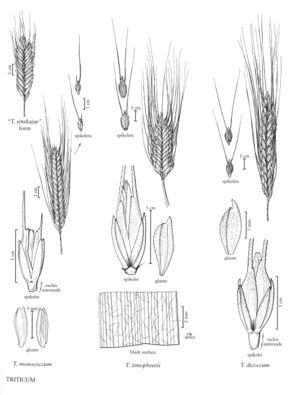Difference between revisions of "Triticum timopheevii"
FNA>Volume Importer |
imported>Volume Importer |
||
| (4 intermediate revisions by 3 users not shown) | |||
| Line 31: | Line 31: | ||
|basionyms= | |basionyms= | ||
|family=Poaceae | |family=Poaceae | ||
| − | |illustrator=Cindy Roché;Hana Pazdírková; | + | |illustrator=Cindy Roché;Hana Pazdírková;Christine Roberts |
|illustration copyright=Utah State University | |illustration copyright=Utah State University | ||
|reference=None | |reference=None | ||
| Line 37: | Line 37: | ||
|publication year= | |publication year= | ||
|special status= | |special status= | ||
| − | |source xml=https:// | + | |source xml=https://bitbucket.org/aafc-mbb/fna-data-curation/src/200273ad09963decb8fc72550212de541d86569d/coarse_grained_fna_xml/V24/V24_388.xml |
|subfamily=Poaceae subfam. Pooideae | |subfamily=Poaceae subfam. Pooideae | ||
|tribe=Poaceae tribe Triticeae | |tribe=Poaceae tribe Triticeae | ||
Latest revision as of 16:23, 11 May 2021
Culms to 140 cm; nodes glabrous or pubescent; internodes mostly hollow, partially solid to hollow for 1 cm below the spikes. Blades to 10 mm wide, densely hairy, hairs 1.5-4 mm. Spikes 5-7 cm, strongly flattened, wider than thick; rachises ciliate at the nodes and margins; internodes 1.5-2.5 mm, disarticulating with pressure, dispersal units wedge-shaped. Spikelets 16-18 mm, elliptical to ovate, strongly flattened, with 3 florets, usually the lower 2 seed-forming. Glumes 7-10 mm, usually coriaceous and tightly appressed to the lower florets, sometimes chartaceous, acute, with 1 prominent keel, keel winged only in the distal 2/3, terminating in a tooth; lemmas 10-12 mm, lower 2 lemmas awned, awns to 9 cm; paleas not splitting at maturity. Endosperm flinty. Haplomes AbG. 2n = 28.
Discussion
Triticum timopheevii is the domesticated derivative of T. araraticum Jakubz. It is established in Georgia, Armenia, and northeastern Turkey. It differs from other species of Triticum in its long leaf hairs and their relatively higher density. Plants with tough rachises and chartaceous glumes have been named T. militinae Zhuk. & Migush.
Selected References
None.
